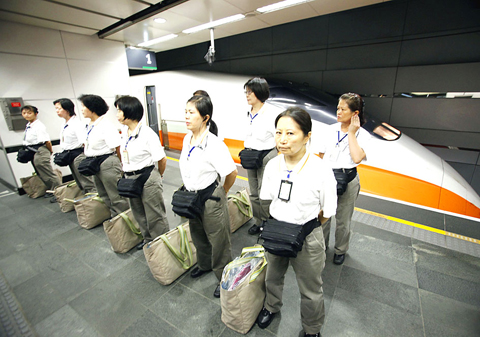Taiwan High Speed Rail Corp (THSRC, 台灣高鐵) chairwoman Nita Ing (殷琪) stepped down from her post yesterday and an ad hoc board meeting elected chief executive Ou Chin-der (歐晉德) to replace her.
Ing, 54, who founded THSRC in July 1998 after winning the nation’s first build-operate-transfer contract to construct the north-south high speed railway two years earlier, said she hoped her resignation could help reverse the company’s finances.
“My career means nothing if more government participation can help the company run smoothly and profitably,” Ing said through THSRC spokesman Ted Chia (賈先德).

PHOTO: NICKY LOH, REUTERS
Chia said Ing announced her decision to step down at the beginning of the board meeting and the board named Ou to the chairmanship under his capacity as the legal representative of the state-run China Aviation Development Foundation (航發會).
The reshuffle, which took effect immediately, ushers in a new era for THSRC, one in which the government will assume a dominant role in deciding the board lineup and management.
The government has a nearly 40 percent stake in the company. THSRC has accumulated more than NT$450 billion (US$13.8 billion) in debts and is seeking a syndicated loan worth NT$390 billion.
Neither Ing nor Ou showed up at the unscheduled press conference after the board meeting. Chia said Ing would remain a board member representing Continental Engineering Corp (大陸工程), one of THSRC’s five founding shareholders, while Ou would serve as both THSRC chairman and CEO.
Last night, however, the company said in a stock exchange filing that Ing would also step down from the board and Continental Engineering would nominate a successor soon.
Chia said the company would call an extraordinary shareholders’ meeting on Nov. 10 to elect a new board of directors and supervisors.
He declined to comment on reports that Ing resigned to ensure government support for the bank loan.
“The former chairperson made no mention of such pressure,” Chia said. “She did extend gratitude to all THSRC employees for helping realize the high speed rail project.”
Ou, 65, a civil engineer by training, will soon brief the media on how he plans to improve the company’s finances and operations, Chia said.
Ou joined the public service sector in the late 1980s and has worked for the national expressway engineering bureau, the public construction commission and the central government. In 1998, he was tapped by then-Taipei mayor Ma Ying-jeou (馬英九) to serve as deputy mayor. He retained his friendly ties to Ma and the Chinese Nationalist Party (KMT) after joining THSRC in 1996 at Ing’s invitation.
Ou has avoided reporters since news broke over the weekend that Ing would be stepping down. Premier Wu Den-yih (吳敦義) said on Sunday that Ing planned to resign.

CHIP RACE: Three years of overbroad export controls drove foreign competitors to pursue their own AI chips, and ‘cost US taxpayers billions of dollars,’ Nvidia said China has figured out the US strategy for allowing it to buy Nvidia Corp’s H200s and is rejecting the artificial intelligence (AI) chip in favor of domestically developed semiconductors, White House AI adviser David Sacks said, citing news reports. US President Donald Trump on Monday said that he would allow shipments of Nvidia’s H200 chips to China, part of an administration effort backed by Sacks to challenge Chinese tech champions such as Huawei Technologies Co (華為) by bringing US competition to their home market. On Friday, Sacks signaled that he was uncertain about whether that approach would work. “They’re rejecting our chips,” Sacks

NATIONAL SECURITY: Intel’s testing of ACM tools despite US government control ‘highlights egregious gaps in US technology protection policies,’ a former official said Chipmaker Intel Corp has tested chipmaking tools this year from a toolmaker with deep roots in China and two overseas units that were targeted by US sanctions, according to two sources with direct knowledge of the matter. Intel, which fended off calls for its CEO’s resignation from US President Donald Trump in August over his alleged ties to China, got the tools from ACM Research Inc, a Fremont, California-based producer of chipmaking equipment. Two of ACM’s units, based in Shanghai and South Korea, were among a number of firms barred last year from receiving US technology over claims they have

It is challenging to build infrastructure in much of Europe. Constrained budgets and polarized politics tend to undermine long-term projects, forcing officials to react to emergencies rather than plan for the future. Not in Austria. Today, the country is to officially open its Koralmbahn tunnel, the 5.9 billion euro (US$6.9 billion) centerpiece of a groundbreaking new railway that will eventually run from Poland’s Baltic coast to the Adriatic Sea, transforming travel within Austria and positioning the Alpine nation at the forefront of logistics in Europe. “It is Austria’s biggest socio-economic experiment in over a century,” said Eric Kirschner, an economist at Graz-based Joanneum

OPTION: Uber said it could provide higher pay for batch trips, if incentives for batching is not removed entirely, as the latter would force it to pass on the costs to consumers Uber Technologies Inc yesterday warned that proposed restrictions on batching orders and minimum wages could prompt a NT$20 delivery fee increase in Taiwan, as lower efficiency would drive up costs. Uber CEO Dara Khosrowshahi made the remarks yesterday during his visit to Taiwan. He is on a multileg trip to the region, which includes stops in South Korea and Japan. His visit coincided the release last month of the Ministry of Labor’s draft bill on the delivery sector, which aims to safeguard delivery workers’ rights and improve their welfare. The ministry set the minimum pay for local food delivery drivers at